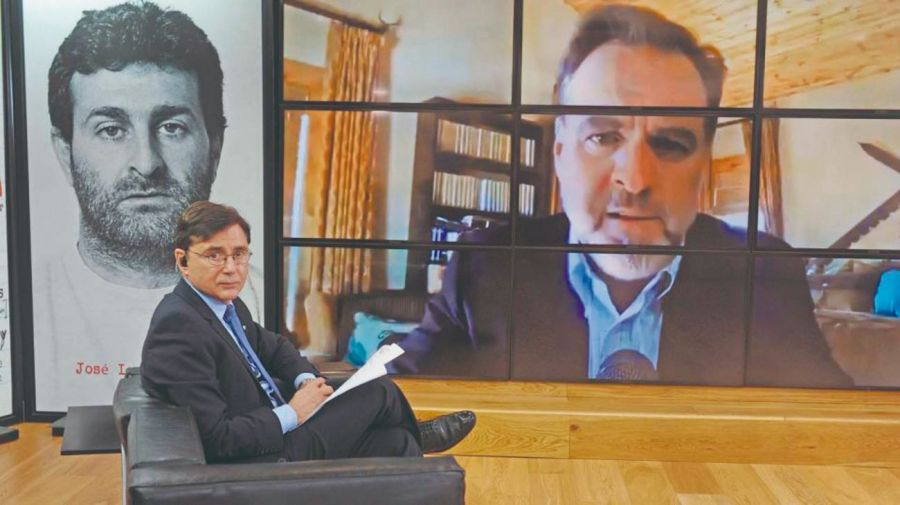A brilliant polemicist, Scottish historian and professor Niall Ferguson anticipated the fall of the Berlin Wall and the coronavirus health crisis. In the current context, he foresees higher inflation for a post-pandemic world and believes that the Joe Biden administration will have to be very attentive to the issue. For the Democrats, he sees more continuities than rifts with Trump, especially in relation to China. Knowledgeable about the situation facing Argentina, he says that economic failure can be explained by politics. If he had to sum it up in one word, it would be quite simply: "populism."
Niall, you say that in a crisis like the current one, “there are no progressive or conservative responses,” but rather “smart or stupid” ones. Are the categories of left and right still valid in understanding world politics today? And how would you define yourself ideologically?
Well, of course, left and right still very much exist. And the extreme left and extreme right have been gaining ground in recent years. But in the face of a public health emergency like a pandemic, it's clear that the ideological distinctions are actually rather unhelpful. And one can see around the world that responses have been bad in some conservative governments and bad in some left-wing governments. The real successes have been in those countries that understood the practical problems posed by the new coronavirus, for example, Taiwan and South Korea.
I myself am a classical liberal. That is to say, I believe in the ideas of the Enlightenment and the great 19th-century liberal thinkers. But nowadays that makes you a conservative because people on the left regard even liberalism as a threat to their ideology.
You also said that the Democrats in the United States “did not understand why Donald Trump won”? What don't they understand?
There were two reasons why Donald Trump became president in 2016. One was economic: that a significant proportion of American voters felt that they had lost out from two decades of globalisation and relatively free migration. But the second, equally important reason was cultural. Many Americans felt alienated by the kind of ideas that we sometimes call ‘woke’ far-left ideas of multiculturalism and gender fluidity. And so Trumpism was both economic and cultural and looking at the performance of the Democrats after four years of Trump, although they were able to get Joe Biden elected, I don't think a great many Democrats have fully understood the reasons why so many people voted for Trump. But of course, even more people voted for him in 2020, even though it wasn't enough for him to win. So the Democrats have a long way to go, I think, before they really address the frustrations of those people who voted for Donald Trump in 2016 and 2020.
What would the electoral map of the United States have looked like if there had been no pandemic?
I think if the pandemic hadn't happened, Trump would probably have won. Remember, the margin of Joe Biden's victory was not huge. The Democrats did not do well in the House [of Representatives[ or Senate elections, which they only scraped home to victory after runoff elections in Georgia. If you take away the pandemic, which, of course, delivered a huge public health and economic shock and which Donald Trump clearly did not manage well, if you take all that away, it seems to me quite likely that he would have won a second term because the economy would have continued to be very strong indeed. And on that issue, which is so often the most important issue in politics in the United States, as in Argentina, then Donald Trump would have been unassailable. He would have had a full employment economy. He would have successfully run the economy, not without generating inflation. And I think it would have been very hard for Joe Biden to stop him under those circumstances. So the pandemic saved the Democrats from a second Trump term.
Before the election, you said that Biden's victory would leave no room for debate. Did you expect him to win by more?
Well, I think the polls predicted a much bigger Democratic win. In fact, they foresaw a really decisive, even a landslide victory for Biden. And that was not what happened. And indeed, if anything, the polls failed to identify how well Republicans would do down the ballot or how poorly the Democrats would do in the House elections and how narrowly the results would go in their favor in the Senate. So the polls were off. I don't actually base my political assessments on polling because I think we learned in 2016 and in other elections how wrong polling can be. So my guess was that Trump would lose, but it would be relatively close. And certainly the Electoral College margin of victory for Biden was really a very slim one by historic standards. I think the key to this was that Trump continued to motivate and mobilise Republican voters despite the effects of the pandemic on their health and on their economic situation. And that meant that they would also have been a landslide victory for the Democrats under the circumstances was really quite a quite a narrow victory.
And how would you describe Donald Trump's and Joe Biden voters from the social cultural point of view?
Well, it's partly a regional story and it's partly a story of the urban rural divide. Overwhelmingly Democrats turn out in the big cities and the big cities are now the key to the Democratic Party's success. Republicans do well in small towns and in rural areas so that if you look at a map on a county by county basis, it's mostly red. It's just that Democrats control the most densely populated counties. The critical difference in this election was not race. Those people who say that the election was about race have missed the fact that the Republican share of the Hispanic vote and the African-American vote went up. The reason that Trump lost was really that he lost the suburbs, the outlying prosperous parts of American cities where a lot of people, particularly white female voters, had voted for him in 2016. Those voters did not vote for him in 2020. He had lost them. And that really was where the election was decided among whites and female voters in the suburbs. And that will be the battleground, I predict, in the next election in 2024.
Professor, Donald Trump and Jair Bolsonaro say that they were protecting the economy. Could anything else have been done to take care of it?
Oh, yes, absolutely. There were better alternatives than the lockdowns that we ended up adopting in the United States, in Argentina and in many other countries. If Western countries had responded – as Taiwan did and South Korea did in January of last year – by ramping up testing, by contact tracing and by isolating infected people, we could have avoided lockdowns and we could have limited significantly reduced the number of deaths.
But we chose not to do that. We chose, in fact, to spend January, February and the first half of March hoping that it would go away and we'd be safe by sheer luck. But that is not a strategy. And I think we have to look back and say that in most Western countries in Europe, in North America and South America, public health bureaucracies and governments made terrible mistakes that have cost us not only a very large death toll, but also a very severe economic shock that could have been avoided.
It is said, and you’ve written about it, that the first hundred days of government are essential for an administration. Joe Biden's time coincides with vaccination and one of the worst moments of the pandemic. Will he be able to deploy a programme in?
Well, in some ways, Joe Biden's timing has been lucky, the vaccination programme, Operation Warp Speed from the Trump administration was hugely successful in providing abundant quantities of vaccine for the American public. And all the Biden administration had to do was to make sure that it got distributed. And after some initial hiccups that has been done very successfully, much more successfully than in Europe and only slightly less effectively than in the United Kingdom.
The second thing that Biden's been able to do is get a very big fiscal stimulus of US$1.9 trillion passed, and that essentially continues the policy of the previous administration. It's really a second version of the Carers Act of March of last year now that they turn their attention to more difficult things, for example, an infrastructure bill and also the question of immigration reform, these will be more difficult to pull off. And I'll add one more thing. The Biden administration has spent the 100 days essentially continuing the Trump foreign policy towards China that are clearly changing the policy towards Iran. So for me, the striking thing about this administration is how much continuity there is from the previous administration, despite the fact that all Democrats swear that they hate Donald Trump and want nothing to do with him. In fact, they're continuing a great many of Trump's policies right now.
And what role will the so-called ‘Democratic Left’ be playing in the future in the new government? What level of influence will characters like Bernie Sanders or Alexandria Ocasio Cortez have?
That's difficult to answer, of course, whether they sit in the Senate like Bernie Sanders or Elizabeth Warren or in the House like Alexandria Ocasio Cortez. They don't have a direct part to play in the administration, in the Executive branch, but they do have influence. And I think Joe Biden and his vice-president, Kamala Harris, will be making sure that they don't do anything to alienate those people. Thus far, I have been impressed by the unity of the Democratic Party since the election. And I think that's partly because the Biden administration is combining aggressive economically expansionary measures like the stimulus and the coming infrastructure bill with what you might call virtue signalling executive orders designed to please the people on the left. And so, in many ways, the administration is combining the economics of progressivism with the kind of ideology of workers. And it's doing that enough to keep Alexandria Ocasio Cortez quiet. So, yeah, I think this is quite clever. In fact, on the part of Biden and his people thus far, they've managed to maintain Democratic unity, despite, of course, the reality. There are deep divisions within the party.
You say that Trumpism will be relegated to the Internet or television. It will exist as an entertainment thing. The Republican Party will spend four years putting himself back together. Will Trumpism continue to lead the Republicans?
Well, first of all, I think Donald Trump has faded from the scene faster than most pundits expected. That's partly because he got cancelled from social media and for a period was effectively off air. But his return to public statements, I think, has been notable for their lack of impact. True, there are still a great many Republican voters who believe in Donald Trump and would love to see him return as a candidate in 2024. But I don't think it's going to happen and I don't think it's going to happen, partly, because it's hard to have a second act in American political life. In fact, it's hard to think of more than one past president who's had two non-consecutive terms. It was Grover Cleveland in the late 19th century.
So I don't think Trump will make a comeback despite his continuing popularity. I think the thing that will go wrong for the Democrats is the economy. I suspect the economy will overheat in the second half of this year and the Fed will be forced to tighten at some point, ending the post pandemic party.
I think immigration is a real problem for the Democrats. Already, the signal that the border is kind of open has attracted a great many unaccompanied minors towards the southern border. That's going to be an issue. And lastly, I think the issues of workers, some of the cultural left, are fundamentally unpopular across the nation. And the lesson of the Obama era is that even in the space of two years, you can go from hero to not quite zero, but certainly not so popular. Think of how quickly the political pendulum swung against the Democrats in 2010 when there was a huge backlash against the Obama administration that delivered the House to the Republicans and the Tea Party, which was the populist movement of that time. So I'd be surprised if this didn't play out in much the same way things will go wrong. They always do. And you can begin to see the kind of things that will go wrong. Let's also not forget that the crimewave that we've seen since last summer, massive increases in homicide numbers in major American cities, that haven’t fully sunk in politically if the police and the local authorities don't get a grip. I think this will become another issue that the Republicans can beat Democrats with.
In your recent text called ‘Great Expectations,’ you wrote that annual UK inflation reached 23 percent in 1975. That year, as an 11-year-old boy, I wrote a letter to the Glasgow Herald – my first publication – in which I regretted the price of shoes, because I could see my mother's shock every time I needed a new pair. Prices were growing 14 percent, significantly faster than my feet were growing. In 2018, Argentina had 47.6 percent inflation; in 2019, 53.8 percent; and in 2020, 36.1 percent with recession and prizes frozen. How do you image life will be for Argentina next year?
Well, Argentina has had far more serious problems with inflation than the United Kingdom or the United States. And so as somebody who's studied the Argentine economy, I'm well aware of how often there have been inflation crises in Argentina.
As the world comes out of the pandemic, which it's gradually doing this year, I think the inflationary pressures will be quite intense for Argentina and other South American countries. After all, in response to the supply shock caused by the pandemic, governments – including the Argentine government – have increased their spending. Deficits have blown out. And of course, at the same time there's been monetary expansion. So the ingredients are clearly in place for the familiar cycle of rising prices and a depreciating currency. And this will continue to be Argentina's recurrent problem until the government finally and credibly can end inflation and introduce time-consistent fiscal and monetary policies. And those of us who are fond of Argentina hope year after year that this will happen. And again and again, we are disappointed because even the last government, which came very close to success, ultimately made mistakes with monetary policy that allowed inflation to get back out of hand. And one can only look ahead and hope that the next government, whoever it is led by, does a more successful job.
To understand inflation, they consider the concept of “expectation” is essential. How do you technically differentiate between expectation and hope? And how do you avoid falling into psychological or sociological bias?
Well, economists have long understood that there is a kind of connection between the money supply and the price level.
But when you ask the question, ‘Why does the expansion of the money supply lead to inflation?’, you can't leave out expectations because it's really what people expect to happen that drives the inflation process. If people have confidence that the government is only temporarily allowing the deficit to expand or a central bank is only temporarily easing monetary policy, and that won't continue. But then, in fact, expansion does not lead to inflation. People have confidence. This, of course, is what the Federal Reserve says will happen in the United States this year. Inflation will go up a bit, but people worry about it and then expect it to come down again. And so it will.
But in a country where there's a terrible track record on the part of politicians and central bankers, where inflation is something that everybody has experienced, even young people, then expectations are generally much more pessimistic. And people quite reasonably assume that if the central bank has cut rates or is expanding the money supply and if the government is borrowing to the hilt, then there'll be more inflation to come. So you can't really get around expectations in any serious theory of inflation.
The difficult bit is knowing what causes them to change. We know why it would be very hard to persuade Argentines [that] price stability is here to stay. They would always be waiting for the next bout of inflation. What we'll see in the United States later this year is whether Americans trust the Federal Reserve enough to accept temporarily higher inflation or whether they will conclude that, in fact, inflation is going to be permanently higher. And nobody really knows if that's going to work out or not. The Fed certainly hopes it'll only be a temporary blip, a temporary increase in inflation. But if inflation expectations change and people expect more inflation, then I think the Fed will be wrong.
Will the post-pandemic years be inflationary and will it affect the entire world economy? You have spoken of Larry Summers' warnings.
I take Larry Summers very seriously, he’s a brilliant man, an extraordinary economist, and of course, he has been US Treasury secretary. So he's not just a theorist, he's a man of practice. Larry Summers, four years after the financial crisis, warned it would be secular stagnation and that interest rates and inflation rates would remain low for the future. So when Larry Summers said last month that he foresaw a kind of overheating, that the fiscal stimulus was going to be too much and that there would be a risk of inflation. I took that very seriously because it represented a major change in his position.
And I think he could be right. The scale of the fiscal stimulus is much, much greater than the economy needs, given the way in which vaccination is propelling the recovery. Already, there are all kinds of signs of overheating already in those parts of the economy that have been open. And I think it is risky, just as it was in the 1960s, for the government to embark on an ambitious social welfare programme when it already has a significant amount of debt. And the amount of debt, of course, today is far, far higher than it was back in the 1960s. So I think if Larry Summers is worried about inflation, we should all be worried about inflation. And we should take with a certain amount of scepticism the reassurances of [Jerome] ‘Jay’ Powell, the Fed chair, that it'll all be all right and we'll only have a temporary uptick in inflation later this year.
Janet Yellen has just been saying that there may be a small risk of inflation that is manageable. Is the US government aware of the situation?
Well, I absolutely know they're aware of it. They would be crazy to ignore the risk. It's there to be seen in at least some price data already – commodity prices, for example. It's there if you also look at the labour market. Janet Yellen is an extraordinarily experienced policymaker, as well as a very talented economist. And I think when she says we have the tools, what she really means is that the Fed has the tools that if the economy shows signs of overheating, if wages and prices are moving up too fast, then they will have to raise rates. And, of course, they'll also taper quantitative easing. But we've seen in the past how difficult that is to do. And you'll remember that the Fed actually panicked when it tried to tighten on previous occasions. So I think it remains to be seen if the Fed has the guts or the nerve to use the tools. It certainly has the tools, but it remains to be seen if they'll be able to use them. And also it remains to be seen what the costs will be, because obviously a tightening of policy will have massive implications for a highly leveraged economy and will certainly bring to an end the extraordinary stock market boom of the last 12 months on the explanation of inflation.

In Argentina, the role of other factors on inflation is discussed, such as the role of the so-called “price makers.” Are fiscal and monetary issues the only causes?
Milton Friedman famously said that inflation was always and everywhere a monetary phenomenon. And I made the point in my article that historically it's usually a fiscal and monetary problem. You actually generally find the starting points of the trouble in fiscal policy. But that wasn't the end of my argument – in that piece. I went on to say that inflation is also a political phenomenon because you can't really understand why governments run large budget deficits until you understand the politics behind them.
And I think in the case of Argentina, you have a very good illustration of a broader point, a political economy point, which is that if key interest groups gain or at least are able to cope with inflation at the expense of other groups, then inflation will keep happening.
It's a political phenomenon in the sense that you can't really understand inflation until you understand who gains from it and who loses from it and who calls the political shots. And Argentina is a very good illustration at this point because it's difficult to fix the problem because of the social and political structure that underlies Argentine politics.
Is fiscal policy as important, sometimes more important than monetary policy, in determining the price level? Does this explain why in Argentina under the last year of Macri there was practically zero emission and inflation was around 50 percent.
Yes, in a famous article back in the late 1980s, the Nobel Prize-winning economist Tom Sargent talks about the kind of regime change you need to bring inflation to an end. And what he meant was that there needs to be really quite drastic changes in both fiscal and monetary policy in order to persuade people that there really has been a change. And I think that's really the key for Argentina. It doesn't really matter in the short run what governments do. They don't have credibility. And the reason they don't have credibility is that voters have been burned once too often. They've been disappointed multiple times by multiple governments. And therefore, it's very difficult to persuade them that a period of price stability is ever going to come, that that is the challenge that any country grappling with inflation faces. It's not unique to Argentina. There were countries in Europe that had a recurrent inflation problem, I think, for example, of Italy. And it was only by actually giving up the lira, the Italian currency and joining the euro that the Italians were able finally to have a much lower inflation rate because effectively they lost control of monetary policy. That's not something that's going to happen to Argentina, but it gives you an idea of the kind of quite drastic things you have to do to end inflation.
And you roll that into monetary expansion, like the fiscal deficit with which they are often associated, are the result of policy decisions which are rooted in the mental models of decision makers, originated in some combination of experience and the study of history. In the case of Argentina, what responsibility do mental models have in the inflationary process?
Well, those mental models I [have] talked about are in everybody's head. We all have some sense of what causes inflation, even if we never studied economics and so we all will adjust our behavior if we think that inflationary pressures are going to grow. So I think most people have a theory of inflation. Even as a schoolboy, as you mentioned earlier, I had a theory of inflation, though I didn't really understand it very well.
Politicians are no different. Even if they didn't study economics, they get that it’s a bad idea to let inflation run out of control. They understand that balanced budgets and stable monetary growth rates are the ways to avoid inflation. But they also know that there are temptations and the strongest temptation in political life is to spend public money. There is this wonderful notion which is increasingly fashionable thanks to so-called ‘modern monetary theory,’ that you can spend any amounts of money and finance it by printing money at no inflationary cost. If you like, you could even give everybody a universal basic income and simply print the money and all will be well. Now, this is historically an absurd view. Every time anything like this has been tried in any country you might name, the results have been inflation. But this kind of fashionable idea encourages politicians to say, well, taxes are unpopular, spending is popular, so let's spend and not tax. And that's the basic political calculus that leads to inflationary policies. And remember, Democratic politicians are always wondering how to get re-elected. And so it's always tempting to try to use deficit finance to achieve re-election because you don't want to raise taxes in an election year, but you do want to increase public spending. So the politics of inflation are very clear. The incentives for politicians are definitely not to produce price stability. The incentives are, in fact, to generate inflation.
Many economists, more neo-Keynesianism in orientation, who support Latin American populists in government, say that it is not such a bad thing to tolerate high levels of inflation in exchange for a certain level of wellbeing in the population. Is inflation always bad? And why?
Well, of course, it depends what rate of inflation you're talking about. Most people and I think most economists certainly would say that an inflation rate of five percent is not disastrously worse than an inflation rate of two percent, but an inflation rate of 10 percent is probably quite a bit worse than an inflation rate of five percent. The problem here is that you don't necessarily get to just hold your inflation rate exactly where you want it. If you allow inflation to go from two to five percent, it can quite easily get to 10 percent because inflation expectations have ceased to be stable. The thing about inflation, in other words, is that it's a dynamic process. You may say that you believe there's a trade off between unemployment and inflation. Therefore, you should let inflation go up in order to get inflation and to get unemployment down. But often that kind of calculation goes wrong because you end up with more inflation than you expected and actually less employment. So I think for decades, really, all the way back to the period after World War Two, when John Maynard Keynes – his ideas were very influential – governments have run this experiment of trying to get to full employment with just a little bit of extra inflation, and often, especially in the 1970s, that has gone horribly wrong because they've ended up with a lot of inflation without really much of an improvement in the employment situation. That was the situation I grew up with in Britain in the 1970s. And it was also, to some extent, the problem in the United States in that decade. And we spent a long time painfully bringing inflation under control on both sides of the Atlantic. I'll be very disappointed if we end up repeating the mistakes of the 1960s and 1970s just because we think we've solved the inflation problem in the last 20 years.
What is a social and ideological differences between the Woodstock generation and the ‘Wokestocks,’ as you wrote, today?
Well, I made that play on words because in some ways, the young today seem rebellious and into protest the way the young generation of the 1960s did. But there's a really big difference when you look at the attitudes of today's ‘woke,’ – young people and the hippies of the late 1960s, for example, the hippies believed in free speech. They wanted to let it all hang out. And in fact, they regarded the conservatives of that time as the opponents of free speech. Today, ironically, the conservatives are in favour of free speech. Young people on the left who are against it, who use phrases like hate speech to justify censorship, cancelation and no platforming. And I must say, I feel rather nostalgic for the young people of the late 1960s because in many ways they not only had the right attitude towards freedom, they were in favour of it. But also, I think they had a lot more fun than today's young people who seem to be a rather miserable neurotic lot. So there's a sort of difference not only of of principle, but also a very big difference of style.
A few days ago, Argentina’s Economy Minister Martín Guzmán, a disciple of Joseph Stiglitz and a former professor at Columbia, said “fiscal discipline is not right wing.’ Is he right?
I don't think it should be ideological. After all, the economics is quite straightforward. Are any governments, even the government of the United States that borrows a large percentage of GDP year after year after year? ...
The problem is the number of countries that have successfully grown their way out of a large debt is really quite small. And the number of countries that have got into fiscal difficulties ending either inflation or default is really quite large. So the conclusion that I draw from history is that it's not an ideological position. And in fact, it's slightly silly for people on the left to claim that austerity is a conservative position. In truth, all governments, whether they are socialist or conservative or somewhere in the middle, are constrained by the rules of the budget and of economics. And if you try to break those rules, it doesn't really matter if you're a conservative or a socialist. If you try to break those rules, it will likely end either with you having to raise taxes or cut spending, all with you having to inflate or with you having to default.
You wrote: “Economic historians have long known that for most of history, war has been the main driver of movement in inflation expectations. Pandemics have generally not had this effect.” There has often been talk of war against the virus.
Well, it's fascinating, isn't it, to look back through the past and ask what has been the principal cause of inflation? And the answer is war in most cases throughout history. And it's fairly obvious why, that is because war not only disrupts supply and creates shortages, it also leads to large deficits. And governments usually print money if they can during wartime. But there are, of course, exceptions to the rule. You can achieve a large deficit and monetary expansion by increasing your domestic spending. You don't need to fire a shot. And that's something that we've seen a lot of in the last 20 years. A key point about war, I think, is the effect it has on expectations. If you spend a lot of money on a peacetime welfare programme, the risks of it going very wrong are quite low. It might not work brilliantly, but it won't go as wrong as a war if you spend a lot of money on a war and you lose the war and Argentina has some experience of that, then expectations really do tend to take off because people suddenly realise that all this money has been spent and the result has in fact been defeat. So a big predictor of inflation throughout history is not just war – it's losing a war. And that's why the story of Germany after World War I is such a famous one, because Germany, which was widely regarded as a very sophisticated advanced economy, ended up with one of the worst inflations in all of history by 1923. Because it spent a huge amount of money and lost the war, then suffered a political revolution, then spent even more money trying to stabilise itself domestically and of course, paying reparations to the victorious allies. And the result was an entirely worthless currency by 1923.
What policies would Milton Friedman adopt today if he were secretary of the US Treasury?
If Milton Friedman could come back and advise us, I think we'd all be very grateful. Secondly, I think Friedman would be sceptical of the great expansion of entitlements, including a new child poverty measure, because those new measures are almost always permanent. And so a fiscal situation that was already bad becomes worse because you've created new commitments. And at this point, there is an obvious structural shortage in taxation revenues, which is why the federal deficit is projected to be so large for all the years to come as far as the eye can see. Friedman was not somebody who wanted to increase government. He didn't want, therefore, to increase taxes. I think Friedman would have been recommending reform of our welfare system, including the particularly inefficient system of Medicare and Medicaid, which are extraordinarily costly and yet don't deliver good results by international standards. And he would be urging the government to try to bring the deficit down not by raising taxes, but by reducing expenditure and trying really to get us back to where we were in the 1980s and 1990s, when really the size of government was a good deal more limited and the debt was at a much lower level.
What role does the trade war with China play in influencing the inflationary process in the US?
I think the trade war plays a fairly small role. It's obviously increased slightly the cost of importing goods from China. But as far as I can see, Chinese producers have compensated for the effect of tariffs by lowering their prices. And that's why Chinese exports to the US actually grew rapidly last year, despite the fact that the tariffs had not been reduced and they had only been a temporary ceasefire in the trade war. The trade war has not ended, the Biden administration has not reduced the tariffs. But I think the effect on inflation is really very marginal because, as I said, Chinese exporters are perfectly well able to cut costs, accept lower margins to make sure that they don't lose market share in the United States. The trade war, I expect to quietly fizzle out. I don't think the Biden administration is going to raise tariffs any further. But having been the most important thing during the Trump administration, I think the whole question of tariffs will become much, much less important under Joe Biden.
In an interview, you said that “I have observed over a century of American history that often when Democrats presidents are elected with a major domestic agenda, they end up getting into a big wars. It's happened with Wilson, with Rushville, with Truman, with Kennedy, with Johnson. It almost happened with Carter, but he avoided going to war in Afghanistan.” Will Joe Biden be able to produce a war with China?
Well, that, of course, is the big foreign policy worry that many people have today. There were, of course, Democratic presidents who avoided big wars. That was something that Bill Clinton tried to do, though he ended up having to intervene in Bosnia. And then, of course, Barack Obama declined to intervene in Syria and therefore avoided what might have been a bigger conflict on his watch. Joe Biden, I think, is in a different situation because we now see much more clearly than we saw 10 years ago, the scale of the Chinese challenge to the United States. We now see that that challenge is ideological, it's technological, it's military. And it's very difficult for the Biden administration to turn the clock back to 2016. In fact, what they're doing is carrying on many of Donald Trump's policies on a wide range of issues the South China Sea, Taiwan, Hong Kong. And, of course, the technology war is continuing with new restrictions on how American companies deal with Chinese companies when sensitive technology is concerned. The question of whether we end up in a war is a difficult one. I think we're already in a Cold War. I think we're in a Cold War, too. And we've been in the Cold War, too, for about three years. It's just that some people haven't quite come to realise it. It's just a question of whether it becomes a hot war at some point. If there is something that could cause a war, I think it's Taiwan. I think if China were to attempt to take over Taiwan at some point in the next few years, there would be a significant risk of military conflict because the US is supposed to be committed to maintaining Taiwan's autonomy and preventing a forcible incorporation of Taiwan into the People's Republic of China. So that's the issue to watch. And I think judging by the language that the Biden administration has used, they are in a pretty hawkish, tough mood towards China. We'll see what happens when Anthony Blinken meets his opposite number in Alaska [soon]. Perhaps they will come out holding hands and smiling, but I would be very surprised if that happened.
You wrote about the Chinese government's delay in warning about the whole situation in Wuhan and that the intelligence services had been reporting earlier about what was going there. Is China responsible for what is happening in the world today?
Well, I think there has to be some responsibility for the pandemic laid at the door of the Chinese Communist Party, because, after all, it seems pretty clear that the public health crisis in Wuhan began in December, early December, if not earlier, and yet well into January. Officials and Hubei Province were trying to downplay the seriousness of the situation, and were silencing Chinese scientists and doctors who wanted to warn the world. And ultimately, it wasn't until January 23 that Wuhan was really placed in a lockdown and international travel from the cities stopped. So this was a period of weeks when an opportunity was lost to prevent the spread of the virus to the rest of the world. That is a major, major lapse. And the fact that the World Health Organisation is essentially failing to investigate what went wrong tells you that China is not serious about reckoning with its own failures, not that China is uniquely and solely to blame. Many, many other countries made mistakes, which was why it became a global pandemic. But I don't think there's any getting away from the fact that the biggest original mistake was China's attempt to cover up what was going on in Wuhan and its delay in preventing infected people from travelling from that city, a delay that I think must be responsible for hundreds of thousands, if not millions of deaths around the world.
In the credits of your book, The Ascent of Money, you thank Domingo Cavallo, among other international figures such as Paul Volcker and George Soros. What was your relationship with the former Argentina minister like and how do you evaluate his work in Argentina in the 1990s and with convertibility?
Well, I got to know Domingo Cavallo many years ago because, of course, he spent time in American academia, and when I came to write The Ascent of Money and decided I wanted to write about the Argentine experience of inflation, it made sense to interview him, which I which I did. My sense is that Cavallo attempted a near-impossible task, which was to achieve a regime change in the direction of price stability in Argentina. And the methods that he adopted ultimately proved unsuccessful. And that failure, the failure of the policy, of course, did a great deal of harm to his popularity. But I don't doubt that his fundamental strategy was the right one. It was just that execution was imperfect and the obstacles to success proved to be insurmountable. But he's someone for whom I still have high respect.
You wrote in the introduction to that book that “for Christians, attachment of money is the root of all evil.” Pope Francis has a view on economics based on his proximity with Joseph Stiglitz and society, such as well as his good relationship with Kristalina Georgieva. Many say that the origin of this position of the Supreme Pontiff is that he is Peronist.
Well, of course, there's a long tradition that goes all the way back to the early history of the Christian Church of wariness of commerce and even hostility towards finance – the idea that the love of money is the root of all evil is one that's very deeply embedded in Christian thought.
However, I think the Catholic Church has come to understand over the years that poverty is a far greater root of evil and that anything that we can do to reduce poverty will likely reduce the amount of evil and suffering in the world. Now, I don't expect the pope to be an outspoken proponent of free-market capitalism, and I don't think Milton Friedman would have made a very good pope. Pope Francis has shown himself a courageous pope with his recent visit to Iraq, which I admire him for. I'm not going to go so far as to say that he's a Peronist in the Vatican. I think it's inevitable though, that a man with his background, his experience of life in Argentina should take some of that experience with him when he goes to Rome. But my sense is that the papacy needs to keep clear of the debates of economists. There are far too many uncertainties about economics as a discipline for the Supreme Pontiff to want to take sides in the debates between Keynesians and monetarists. As I've said, the love of money can be a source of evil. But the generation of money, the inclusion of people in the financial system, the availability of credit, all of these things can help people out of poverty. And poverty is a much bigger root of evil than the love of money, in my experience about Argentina.
How do you see the historical process of Argentina's decline from your perspective? What was Argentina’s problem?
The simple answer to the question would be the politics of populism. Argentina should be a rich country. It should be one of the world's wealthiest countries. At the time of the late 19th century, it was a country with extraordinary natural resources. And it's not like the world's demand for goods, food has diminished in the last 100 years. On the contrary, it's greatly increased. So I think the only possible explanation for Argentina's economic troubles is bad politics, bad fiscal policy and bad monetary policy in particular. And I think a kind of tendency to try to find shortcuts around the problems of running a modern economy.
Now, you could argue that there are other, more deeply rooted problems, the distribution of land was highly centralised by comparison with North American countries. A great many immigrants ended up crowded into various areas instead of being able to develop the rural areas of the country. But at its roots, I think Argentina's problem has been a political one. And the fact that there is always this temptation when the going gets tough to go back to the Peronist populist solutions. Until Argentina is able to have a sustained government committed to fiscal balance and to monetary stability, this history is just going to keep repeating itself. My hope is that, for example, new technology will make it possible to include people into the financial system who previously have been excluded from it, and that that may help to change Argentina's political economy. I think young Argentines – and I know a great many of them – have impressed me very much with their hope for a better future for their country. And it seems to me there's a lot of talent in Argentina that just needs a better political framework within which to flourish. So I have some optimism that the youth of Argentina sees a brighter future ahead and that maybe, maybe in this generation, Argentina can break its old bad habits that date back many, many decades and finally fulfill the economic potential that it has had for over a century.
Earlier, we asked you what Milton Friedman would do if he were secretary of treasury of the United States. Let me ask you now, what measures would you implement if you were the economy minister of the Argentina Republic?
Well, first of all, you need to have a clear plan to get the country back to fiscal balance. At the same time, you need to have a clear plan at the central bank to end inflationary financing of government deficits. Thirdly, I would aim at a strategy of deregulation and liberalisation so that the labour market, the capital market, are a great deal more flexible than they currently are. And the trade unions would not like that, but it would be the right thing to do. And finally, I would make sure – and I really would prioritise this – that there were massive improvements in the technological infrastructure of the country so that more people are able to access the Internet and access all the different financial and other services that are available there. If you could do those things simultaneously in a kind of big bang of policy change, then I think you would reset expectations and you would also unleash an extraordinary bout of investment in jobs, investment in new businesses, and that's the lifeblood of economic growth. The entrepreneurs of Argentina are deeply discouraged. It is extremely difficult in Argentina to start a new business to get it off the ground, not to be tied up in red tape. It can be done, though. And I think that if a government were able to give the private sector hope – hope for price stability, hope for predictable taxation, hope for a free and flexible labour market – then all kinds of things would be possible that for many years have been very, very difficult in Argentina. So if Milton Friedman could be reincarnated, I hope he would be reincarnated in Buenos Aires and I hope he would become finance minister in a future government and lead that kind of bold reforming strategy that could transform the fortunes of the country in the space of maybe just a couple of years. It really can be done that quickly, but it takes a kind of heroic, courageous leadership to do it. And I think one day, one day that will happen in Argentina as it has happened in many other countries in history.
And my last question, how is your work at [macroeconomic and geopolitical advisory firm] Greenmantle? And specifically your link with the Argentine entrepreneur Pierpaolo Barbieri, who is also a member of the Perfil Advisory Board?
Well, I have been very privileged throughout my career to teach some brilliant young people. And perhaps one of the most brilliant students I had at Harvard was Pierpaolo Barbieri. Ten years ago, after he had done a variety of jobs in finance, we decided to set up an advisory business, Greenmantle, to work on applying history to contemporary financial problems and advising investors. And we've done that, I think, successfully now for a decade. And I've watched with delight and admiration as Pierpaolo has successfully launched Ualá not only in Argentina, but now in Mexico. And he seems to me to personify the kind of qualities that Argentina has and that can make Argentina a prosperous and successful country. That is to say, he has an extraordinary work ethic; he is a phenomenal intellect; he has terrific presentational skills – but above all, he has exceptionally good judgment. And my impression is looking at the brilliant young people that he employs at Ualá, there are plenty more pure Pierpaolos where he came from. So Argentina should have some confidence. There's a lot of talent in your country among this young generation. And it's a reason that I've been involved with ot while I will continue to be involved with Pierpaolo and I hope to see him and it succeed and also to see Argentina succeed in the coming years.




























Comments